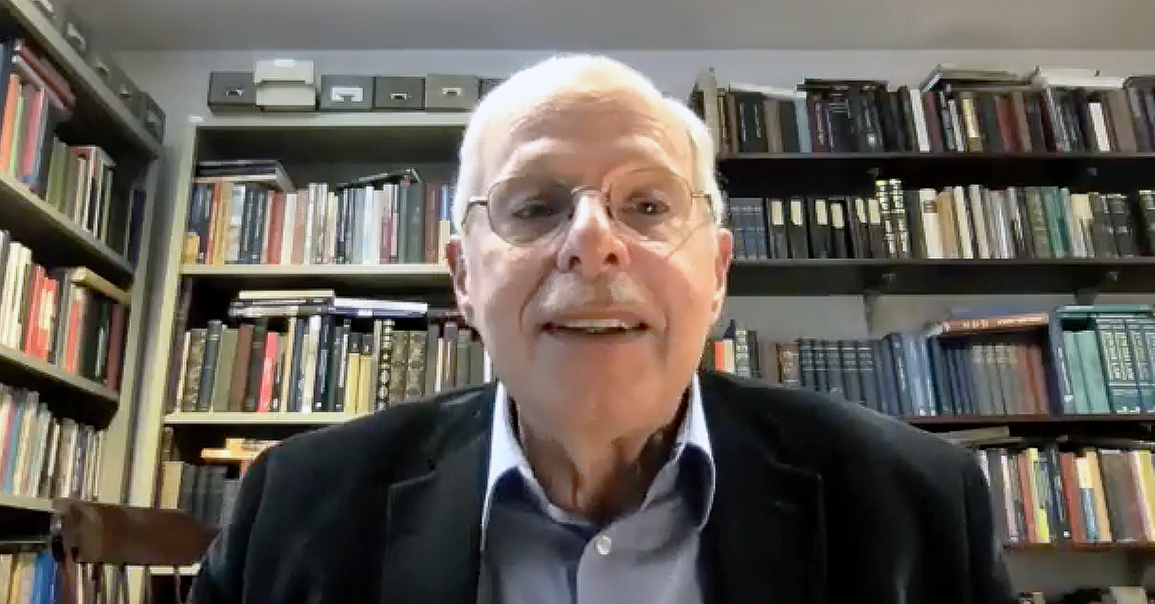
Now designated Professor Emeritus and J. Richard and Dorothy Shiff Chair of Jewish Studies Emeritus, David Novak officially retired at the end of 2022. As Acting Chair Professor Robert Gibbs notes regarding his own field, “David has been a centre of gravity in research and teaching in Jewish philosophy”, and the wrapping up of some 25 years at U of T as longtime colleague and friend has proved to have a long tail. We will, however, be honouring David with an event in October 2023 and will bring you news of the arrangements closer to the time.
David Novak joined the University of Toronto in 1997, as Professor of Religion, Professor of Philosophy and the J. Richard and Dorothy Shiff Chair of Jewish Studies. He previously served as Edgar M. Bronfman Professor of Modern Judaic Studies at the University of Virginia following two decades of rabbinical ministry in synagogues across the United States. He took his undergraduate degree in Classics and Ancient History at the University of Chicago and his Master of Hebrew Letters and rabbinical diploma at the Jewish Theological Seminary of America. He completed his PhD in philosophy at Georgetown University.
Novak’s research has concentrated on Jewish theology and philosophy, weighing its complex history alongside the contemporary challenges. A particular interest has been an ongoing examination of the tradition of natural law theory (which argues that humans possess intrinsic values that govern their behaviour) and how it may be applied and interpreted in the present day. Focusing on fresh exploration of core questions of Jewish belief and practice, his work simultaneously explores how wider debates in political theory have been influenced by Jewish thought.
Internationally recognized for his scholarship in Jewish-Christian relations, Novak has been a leading participant in the dialogue between the two faith groups. In 2000, he was one of four authors of the influential and widely debated text Dabru Emet: A Jewish Statement on Christians and Christianity, first published in The New York Times. Hebrew for “speak the truth”, Dabru Emet is a response to positive changes in Christian doctrines towards Jews. In an attempt to foster deeper dialogue, the text takes the form of a sequence of brief statements that suggest how Jews can view their relationship to Christians, and was subsequently translated into eight languages.
All these interests and more are reflected in Novak’s numerous publications – some 200 refereed scholarly articles, 150 general articles and approaching one hundred reviews, as well as 19 authored books and five edited volumes. Among his works are Natural Law in Judaism (1998), Covenantal Rights: A Study in Jewish Political Theory (2000, winner of the American Academy of Religion Award for 'best book in constructive religious thought’), The Jewish Social Contract: An Essay in Political Theology (2005) and Zionism and Judaism: A New Theory (2015). Athens and Jerusalem: God, Humans, and Nature (2019) won the 2020 Canadian Jewish Literary Award.
Novak’s longstanding commitment to scholarly collaboration is reflected in projects like the co-editorship of the extensive work, The Cambridge History of Jewish Philosophy: The Modern Era (2012) and the co-authored volume Natural Law: A Jewish, Christian, and Islamic Trialogue (2014, with Anver Emon and Matthew Levering).
Half a dozen collections have been published devoted to discussion of his work, including Tradition in the Public Square: A David Novak Reader (2008), Jewish-Christian Dialogue and the Life of Wisdom: Engagements with the Theology of David Novak (2010) and The Achievement of David Novak: A Catholic-Jewish Dialogue (2021).
As well as holding several visiting scholar and professor appointments, Novak has delivered lectures series at Princeton University, University of Oxford, Lancaster University, and most recently the prestigious Gifford Lectures at the University of Aberdeen. A Fellow of the American Academy for Jewish Research and a Fellow of the Royal Society of Canada, his public and professional service includes leadership of scholarly societies, advisory editorial boards, and academic journals spanning the areas of Jewish life and thought, philosophy, religious studies, medical and social ethics, political theory, and religion and public life.


